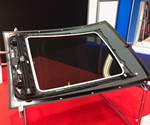Bio4self bio-based autocomposite wins JEC Innovation Award
The Bio4self consortium has developed a bio-based and easily recyclable composite material. It is suitable for mechanically demanding components in the automotive industry.
In the EU project Bio4self, an international consortium with the participation of the Fraunhofer ICT (Pfinztal, Germany) and the Institute of Textile Technology of the RWTH Aachen, has developed a self-reinforced composite of polyactide (PLA). PLA materials are based on lactic acids, which can be obtained from agricultural waste or specially grown raw materials such as sugar cane. In the project, scientists combined two different PLA types with different melting temperatures into a self-reinforced PLA composite (PLA SRPC) so that the higher melting PLA is embedded as the reinforcing fiber in the lower melting matrix.
The resulting material stiffness can compete with commercially available self-reinforced polypropylene (PP) composite materials. The composites are designed for high mechanical strength and rigidity as well as high temperature and hydrolytic stability. In addition, it is fully bio-based, easily recyclable, formable and industrially biodegradable. As the first prototypical applications of the material, the partners present a hybrid seating structure.
This project was awarded a JEC Innovation Award for sustainability, announced at the JEC Innovation Award ceremony on March 12, 2019.
This post is courtesy of the ÂÌñÏ×ÆÞ and Springer lightweight.design magazine media partnership. For more information about Springer and lightweight.design, go to
Related Content
-
JEC World 2024 highlights: Thermoplastic composites, CMC and novel processes
CW senior technical editor Ginger Gardiner discusses some of the developments and demonstrators shown at the industry’s largest composites exhibition and conference.
-
Fall events chart the course for composites
A busy fall brings industry-leading events and recognition for operations setting new benchmarks for excellence.
-
“Structured air” TPS safeguards composite structures
Powered by an 85% air/15% pure polyimide aerogel, Blueshift’s novel material system protects structures during transient thermal events from -200°C to beyond 2400°C for rockets, battery boxes and more.


